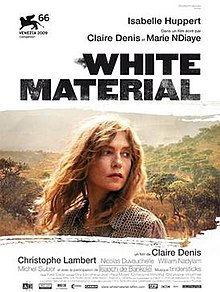White Material
| White Material | |
|---|---|

Theatrical poster
|
|
| Directed by | Claire Denis |
| Written by | Claire Denis Marie NDiaye |
| Starring |
Isabelle Huppert Christophe Lambert |
| Music by | Stuart Staples |
| Cinematography | Yves Cape |
| Edited by | Yann Dedet |
| Distributed by | Wild Bunch Distribution |
|
Release date
|
|
|
Running time
|
106 minutes |
| Country | France |
| Language | French |
| Budget | $6.3 million |
| Box office | $1.9 million |
White Material is a 2009 French film directed by Claire Denis and co-written with Marie NDiaye.
The film stars Isabelle Huppert as Maria Vial, a struggling French coffee producer in an unnamed French speaking African country, who decides to stay at her coffee plantation in spite of an erupting civil war. The film was well received, earning high ratings and appearing in several movie critics' top lists for 2010.
Maria Vial is a white French farmer who runs (with her ex-husband, Andre, and his sickly father) a failing coffee plantation in an unnamed African country in the present day. Maria and Andre have a lazy, mentally unstable son, Manuel, while Andre has another half-African son, Jose. Civil war has broken out and rebel soldiers, many of them child soldiers, are advancing on the area. The French military, while pulling out, makes one final plea for Maria to leave, but unyielding in her desire to protect her family's home and blinded by her own anti-white prejudice, she ignores the warnings. Meanwhile, a rebel DJ on the radio urges the rebels on and advocates attacks on emblems of colonialism. Maria's workers flee for fear of the upcoming conflict. Maria stubbornly refuses to abandon the plantation and its harvest, which will be ready in five days. Risking her life and unable to find Andre, she drives to a village to hire men to finish harvesting the coffee. On the way, she is forced to pay off bandits who threaten to kill her at a roadblock. After hiring the workers, she stops at the elementary school and collects Andre's other son, Jose. Jose is an upbeat boy of about 12. He is black, and we later learn that his mother is Andre's father's young housekeeper.
Meanwhile, we see Andre in town meeting with the African mayor, Cherif. Cherif seeing that Andre is desperate, takes advantage of the situation and offers to purchase the plantation for the cancellation of Andre's debts. Cherif requires Andre to get his father to sign over the coffee plantation to him. Having returned to the plantation, Maria searches out her son Manuel and finds him in bed after midday. Trying to rouse him, she laments his listlessness and scolds that he is without purpose. Manuel rises, and after a swim, is intrigued by a noise in the house. He follows it to two young rebels. They run, and in spite of his lack of shoes, Manuel follows them far from the home. They eventually corner them; he discovers that they're armed with a spear and a machete. The rebel boys threaten him, cut his hair, and retreat to the bush, firing shots from a revolver. Maria, Andre, and some workers converge on Manuel and are shocked to find him stripped and standing naked in the field. The fact that the oldest boy stuck his revolver down Manuel's pants, as well as his state of shock, the dirt on his hands and knees, and his later over-reaction, indicate he was raped off camera. Maria loads him in the tractor and heads back to the house. Manuel obviously traumatized and out of his mind abandons the tractor and goes to his grandfathers home. There the heavily tattooed Manuel reacts to his assault by shaving his head, stealing his grandfathers shotgun, attacking Jose's mother, and disappearing on his mother's motorbike.
...
Wikipedia
